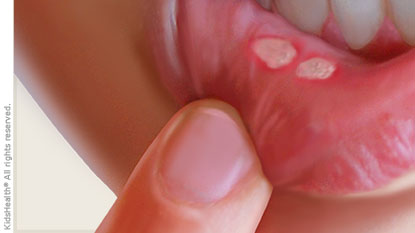Canker Sore Signs, Causes & Treatment
What Are Canker Sores?
If you've ever had those open, shallow sores in your mouth and taken a gulp of orange juice, you know what a pain canker sores can be.
Canker sores (also known as aphthous ulcers) only happen inside the mouth. You can get them on or under the tongue and on the inside of the cheeks and lips — the parts of the mouth that can move. They usually pop up alone, but sometimes they show up in small clusters.
The good news is that they usually go away on their own without treatment.

What Are the Signs of a Canker Sore?
Your mouth might tingle or burn before a canker sore appears. Soon, a small red bump rises. Then after a day or so it bursts, leaving an open, shallow white or yellowish wound with a red border.
The sores are often painful and can be up to half an inch across, although most of them are much smaller. Aside from the annoying pain in the mouth, you'll generally feel OK.
Canker sores are not like some other mouth sores, such as cold sores. You can't get canker sores by sharing food or kissing someone.
If you have a sore and you're wondering if it's a cold sore or a canker sore, just look at where it shows up: Cold sores usually appear outside the mouth, around the lips, chin, or nostrils. Canker sores are always found inside the mouth.
Who Gets Canker Sores?
Canker sores usually begin showing up between the ages of 10 and 20, although they can happen at any time in a person's life. They're fairly common: About 1 in 5 people get them on a regular basis.
About twice as many women as men get them. Doctors think that may be due to the differences in male and female hormones, especially because women often get them during certain times in their menstrual cycle.
What Causes Canker Sores?
No one knows exactly what causes them. But they can run in families. That means if your parents or siblings get canker sores, the genes you share with them make it more likely that you'll develop the sores too.
There may be a connection between canker sores and stress. If you get canker sores around exam time or some other big event in your life, it may be a sign of how much stress you're under.
Mouth injuries (like biting the inside of the lip or even brushing too hard and damaging the delicate lining inside the mouth) also seem to bring on canker sores. Sodium lauryl sulfate (SLS), an ingredient in many toothpastes and mouthwashes, has been linked to canker sores, and sometimes the sores can be a sign of an immune system problem.
Finally, not getting the right nutrition (such as not getting enough iron or vitamin B12) also might contribute to some cases of canker sores.
P
How Are Canker Sores Diagnosed?
Canker sores are fairly common, but that doesn't mean they should be ignored. If you have sores that last longer than 2 weeks or you can't eat or drink because of the pain, call your doctor. Also call if you get the sores more than two or three times a year.
Usually, no tests are needed to diagnose canker sores. Your doctor can identify them based on your medical history and physical exam alone.
In some cases, doctors may want to do blood tests to find out if another condition — like a vitamin deficiency, a problem with your immune system, or even a food allergy — could be contributing to the sores.
How Are Canker Sores Treated?
Most canker sores will heal on their own in a few days to a couple of weeks. While you're waiting for them to disappear, you can take an over-the-counter pain reliever like ibuprofen or acetaminophen for the pain.
You'll also want to watch what you eat. Spicy foods and acidic foods such as lemons or tomatoes can be extremely painful on these open wounds. Stay away from hard, scratchy, or crunchy foods like nuts, toast, pretzels, or potato chips for a while. They can poke or rub the sore.
Be careful when you brush your teeth. Brush and rinse with toothpastes and mouthwashes that don't contain SLS. And avoid brushing the sore itself with a toothbrush, which will make it worse.
If you have canker sores that do not get better after a few weeks, if the sores keep coming back, or if they make you feel so sick that you don't want to eat, call your doctor or dentist. He or she may prescribe a topical medicine or special mouthwash to help heal the sores.
For medicines that are applied directly to the sore, first blot the area dry with a tissue. Use a cotton swab to apply a small amount of the medicine, and don't eat or drink for at least 30 minutes to make sure it isn't washed away.
They can certainly be a pain, but in most cases canker sores aren't serious and should go away on their own.
